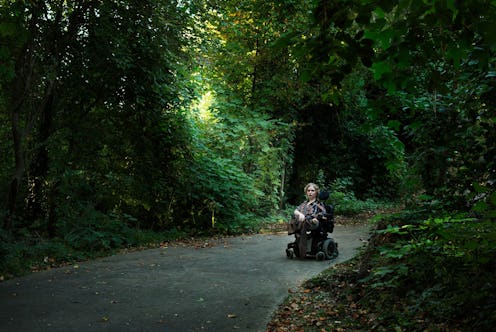Books
Travel Memoirs Are All About Immersive Experiences — But What If You Use A Wheelchair?

My favorite professor led the winter study abroad trip my senior year. A small group, maybe 12 students altogether, including my best friend Katie, left for Cairo on New Year’s Day. During the second and final week, Dr. W led a camping expedition West of the Nile. This portion of the Sahara is a volcanic graveyard, ancient molten mountains windblown and strewn black across the gold-orange sand. It was here, a few days after my 21st birthday, that Katie found a clean dune amid the rocky black and etched my name in large letters into the sand. “So you could be with us,” she said when she showed me the picture back home in Georgia. Camel hoof prints dotted the perimeter of the frame, providing scale.
Most travel memoirs promise exploration, spontaneity, adventure. Grand vistas as the backdrop for inner growth. History and culture. Conversations with locals. Mishaps and majesty. These books promise the reader intellectual and emotional immersion to a place thanks to the author’s ability to convey their own physical immersion.
"Most travel memoirs promise exploration, spontaneity, adventure. Grand vistas as the backdrop for inner growth."
No matter the destination, I’m never fully immersed when I travel. Some places, like Cairo, are near-impossibilities for me and the power wheelchair I use. Most places, though, I could technically visit — with extreme planning, a lot of money, and a fair bit of luck. But even when I manage to get somewhere, find lodging that works for me, and access transportation once there, my experience of a place is only ever partial:
Bourbon Street: studying every detail of the few Mardi Gras masks in the shop window while my mom and sister browse inside, up those stairs.
Virginia: descending a terrifying, rickety old lift into the caverns, losing my breath at the giant stalactites and stalagmites, sating myself on the wonder of that first room, and then waiting in the gift shop for the tour to finish exploring the rest.
Atlanta’s High Museum: craning my neck to see da Vinci’s sketches, an entire exhibit’s worth of them, all hung at standing height.
Saguaro National Park: while my parents stop at every “scenic lookout,” waiting in the car and wondering how different those cacti look without the barrier of tempered glass.
For me, travel comes with a near-constant sense of disconnection. Whether nature or city, inaccessibility is the name of the game, and the portions that are available to me often feel like teasing scraps of the real thing, the real place. Travel memoirs require that the author submit to a locale, to its every hidden corridor and blissful surprise. Authors must let the place become a part of them; they must leave some of themselves behind.
"Travel comes with a near-constant sense of disconnection."
So how to write a travel memoir when no locale will have you? How do you create that immersive experience for the reader when your own immersion is incomplete at best? How do you foster a connection with a place when you’ve never connected with any place?
Would audiences even care? The comparative dearth of travel memoirs written by disabled people might suggest publishing as an industry doesn’t believe they would. But isn’t the joy of travel writing as much about inhabiting another person’s experience as it is about inhabiting another place? We read these memoirs to travel alongside a specific person, watch their specific adventures, soak in their specific perspective. The place —whether Paris or Cairo or the neighborhood bar — is viewed through the author-as-prism. It’s the person, arguably even more than the place, that we’re truly interested in.
"But isn’t the joy of travel writing as much about inhabiting another person’s experience as it is about inhabiting another place?"
“I’m glad you didn’t try to come,” Dr. W said apologetically after she got back from Egypt. “You’d never have managed, not even in the city, let alone the desert.” I thought of the camel prints, deep cups in loose sand, and how my wheelchair’s tires sink with the slightest give. I thought of my name scattered to grains on the western wind.
I think now of the travel memoirs I’ll never write — and of the ones only I can write. Will audiences care? Here’s a better question: why shouldn’t they?